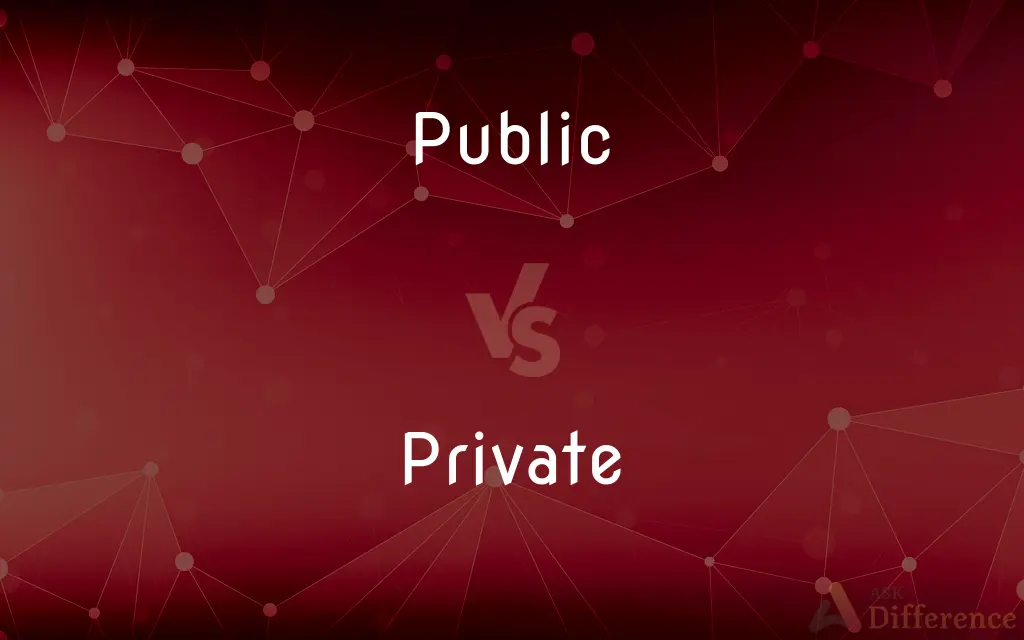Public vs. Private — What's the Difference?
Edited by Tayyaba Rehman — By Urooj Arif — Updated on April 18, 2024
Public institutions or services are government-operated, focusing on public accessibility and benefits, whereas private entities are owned by individuals or corporations, emphasizing profit and exclusivity.

Difference Between Public and Private
Table of Contents
ADVERTISEMENT
Key Differences
Public institutions are typically funded by the government and are accountable to the public, aiming to serve the widest possible community. Private institutions, on the other hand, are funded through private means such as individual investments or corporate funds, and they often target specific groups or interests.
Public services are generally free or subsidized, making them accessible to everyone regardless of income. Private services, however, usually require payment, which can restrict access based on affordability.
Public entities often have a mandate to uphold transparency and public accountability, which subjects them to public scrutiny and regulatory oversight. Whereas private entities are primarily accountable to their owners or shareholders, with less obligation to disclose operations publicly.
In terms of efficiency, public operations can sometimes be slower due to bureaucratic procedures. Private entities typically prioritize efficiency and customer service to remain competitive in the market.
Public institutions often offer stability due to government backing, which can make them less vulnerable to economic fluctuations. Private institutions, in contrast, can be more susceptible to market changes but also have the flexibility to adapt more quickly to new conditions.
ADVERTISEMENT
Comparison Chart
Ownership
Government-owned
Individually or corporate-owned
Funding
Government funds, taxpayer money
Private investments, fees
Primary Goal
Serve the public interest
Generate profit
Accessibility
Generally more accessible to all
May have restrictions based on cost
Accountability
High public and governmental scrutiny
Primarily to owners or shareholders
Compare with Definitions
Public
Maintained at the government's expense or through taxpayer funding.
Public roads are maintained through state and federal funds.
Private
Intended for or restricted to the use of a particular person or group.
Private land is not open to the public without permission.
Public
Open to the general public and typically less restrictive in access.
The public park hosts numerous community events.
Private
Belonging to or for the use of one particular person or group of people only.
She has a private office in her home.
Public
Related to governmental or state affairs as opposed to private or personal dealings.
Public opinion is often polled before elections.
Private
Not available to the general public; confidential.
Private discussions are not disclosed to anyone outside the involved parties.
Public
Serving or representing the people at large.
Public servants include officials like firefighters and police officers.
Private
Not under state control or maintenance; owned by private individuals or companies.
Private healthcare facilities are funded through patient fees.
Public
Pertaining to the community as a whole; accessible by or accountable to all people in a society.
Public libraries offer free access to resources for everyone in the community.
Private
Focused on individual rather than public needs or interests.
Private tutors are hired to address specific student needs.
Public
In public relations and communication science, publics are groups of individual people, and the public (a.k.a. the general public) is the totality of such groupings.
Private
Belonging to or for the use of one particular person or group of people only
His private plane
All bedrooms have private facilities
Public
Of, concerning, or affecting the community or the people
The public good.
Private
(of a person) having no official or public role or position
The paintings were sold to a private collector
Public
Maintained for or used by the people or community
A public park.
Private
(of a service or industry) provided or owned by an individual or an independent, commercial company rather than the state
This research was carried out by private industry
Public
Capitalized in shares of stock that can be traded on the open market
A public company.
Took the company public.
Private
The lowest rank in the army, below lance corporal or private first class.
Public
Participated in or attended by the people or community
"Opinions are formed in a process of open discussion and public debate" (Hannah Arendt).
Private
Short for private parts
Public
Connected with or acting on behalf of the people, community, or government
Public office.
Private
Secluded from the sight, presence, or intrusion of others
A private hideaway.
Public
Enrolled in or attending a public school
Transit passes for public students.
Private
Designed or intended for one's exclusive use
A private room.
Public
Open to the knowledge or judgment of all
A public scandal.
Private
Of or confined to the individual; personal
A private joke.
Private opinions.
Public
The community or the people as a whole.
Private
Undertaken on an individual basis
Private studies.
Private research.
Public
A group of people sharing a common interest
The reading public.
Private
Of, relating to, or receiving special hospital services and privileges
A private patient.
Public
Admirers or followers, especially of a famous person. See Usage Note at collective noun.
Private
Not available for public use, control, or participation
A private club.
A private party.
Public
Able to be seen or known by everyone; open to general view, happening without concealment.
Private
Belonging to a particular person or persons, as opposed to the public or the government
Private property.
Public
Pertaining to the people as a whole (as opposed to a private group); concerning the whole country, community etc.
Private
Of, relating to, or derived from nongovernment sources
Private funding.
Public
Officially representing the community; carried out or funded by the state on behalf of the community.
Private
Conducted and supported primarily by individuals or groups not affiliated with governmental agencies or corporations
A private college.
A private sanatorium.
Public
Open to all members of a community; especially, provided by national or local authorities and supported by money from taxes.
Private
Enrolled in or attending a private school
A private student.
Public
(of a company) Traded publicly via a stock market.
Private
Capitalized in shares of stock that are held by a relatively small number of owners and are not traded on the open market
A private company.
A company that went private.
Took a company private.
Public
Accessible to the program in general, not only to the class or any subclasses.
Private
Not holding an official or public position
A private citizen.
Public
The people in general, regardless of membership of any particular group.
Members of the public may not proceed beyond this point.
Private
Not for public knowledge or disclosure; secret
Private papers.
A private communication.
Public
(public relations) A particular group or demographic to be targeted.
Private
Not appropriate for use or display in public; intimate
Private behavior.
A private tragedy.
Public
(archaic) A public house; an inn.
Private
Placing a high value on personal privacy
A private person.
Public
Open to the knowledge or view of all; general; common; notorious; as, public report; public scandal.
Joseph, . . . not willing to make her a public example, was minded to put her away privily.
Private
A noncommissioned rank in the US Army or Marine Corps that is below private first class.
Public
Open to common or general use; as, a public road; a public house.
Private
One who holds this rank or a similar rank in another military organization.
Public
The general body of mankind, or of a nation, state, or community; the people, indefinitely; as, the American public; also, a particular body or aggregation of people; as, an author's public.
The public is more disposed to censure than to praise.
Private
Privates Private parts. Often used with the.
Public
A public house; an inn.
Private
Belonging to, concerning, or accessible only to an individual person or a specific group.
Her address is private; you can't have it.
Private papers
Public
People in general considered as a whole;
He is a hero in the eyes of the public
Private
Not accessible by the public.
Private property
Public
A body of people sharing some common interest;
The reading public
Private
Not in governmental office or employment.
He quit public life, living quietly as a private citizen.
Public
Not private; open to or concerning the people as a whole;
The public good
Public libraries
Public funds
Public parks
A public scandal
Public gardens
Performers and members of royal families are public figures
Private
Not publicly known; not open; secret.
The identity of the beneficiaries of the trust is private.
Public
Affecting the people or community as a whole;
Community leaders
Community interests
The public welfare
Private
Protected from view or disturbance by others; secluded.
Can we go somewhere more private?
Private
Not traded by the public.
Private corporation
Private
Secretive; reserved.
He is a very private person.
Private
Not shared with another patient.
Private
Accessible only to the class itself or instances of it, and not to other classes or even subclasses.
Private
A soldier of the lowest rank in the army.
Private
A doctor working in privately rather than publicly funded health care.
Private
The genitals.
Private
(obsolete) A secret message; a personal unofficial communication.
Private
(obsolete) Personal interest; particular business.
Private
(obsolete) Privacy; retirement.
Private
(obsolete) One not invested with a public office.
Private
A private lesson.
If you want to learn ballet, consider taking privates.
Private
To make something hidden from the public (without deleting it permanently).
Private
Belonging to, or concerning, an individual person, company, or interest; peculiar to one's self; unconnected with others; personal; one's own; not public; not general; separate; as, a man's private opinion; private property; a private purse; private expenses or interests; a private secretary.
Private
Sequestered from company or observation; appropriated to an individual; secret; secluded; lonely; solitary; as, a private room or apartment; private prayer.
Reason . . . then retiresInto her private cell when nature rests.
Private
Not invested with, or engaged in, public office or employment; as, a private citizen; private life.
A private person may arrest a felon.
Private
Not publicly known; not open; secret; as, a private negotiation; a private understanding.
Private
Having secret or private knowledge; privy.
Private
A secret message; a personal unofficial communication.
Private
Personal interest; particular business.
Nor must I be unmindful of my private.
Private
Privacy; retirement.
Private
One not invested with a public office.
What have kings, that privates have not too?
Private
A common soldier; a soldier below the grade of a noncommissioned officer.
Private
The private parts; the genitals.
Private
An enlisted man of the lowest rank;
Our prisoner was just a private and knew nothing of value
Private
Confined to particular persons or groups or providing privacy;
A private place
Private discussions
Private lessons
A private club
A private secretary
Private property
The former President is now a private citizen
Public figures struggle to maintain a private life
Private
Concerning things deeply private and personal;
Private correspondence
Private family matters
Private
Concerning one person exclusively;
We all have individual cars
Each room has a private bath
Private
Not expressed;
Secret (or private) thoughts
Common Curiosities
How are private institutions funded?
Private institutions are funded through private investments, fees, or other non-public sources.
What defines a public institution?
A public institution is operated by the government and designed to serve the general public.
Are public services free?
Public services are often free or subsidized to ensure broader accessibility.
What is the main goal of a public institution?
The main goal of a public institution is to serve the public interest and welfare.
What is a key characteristic of private ownership?
Private ownership is characterized by control over assets or institutions by individuals or non-governmental organizations.
Can private entities offer public services?
Yes, private entities can offer services to the public, usually through contracts or agreements with governmental bodies.
How does public accountability differ from private?
Public accountability involves higher levels of scrutiny from government and citizens, whereas private accountability is mainly towards shareholders.
What is an example of a public entity?
An example of a public entity is a state university or a municipal government.
What is an example of a private entity?
Examples of private entities include private businesses or personal property.
Why might someone choose a private service over a public one?
People might choose private services for higher quality, specialized offerings, or faster service.
How do public and private entities handle economic downturns differently?
Public entities may receive government support during downturns, while private entities must rely more on market conditions and private funding.
Share Your Discovery

Previous Comparison
Plane vs. Surface
Next Comparison
Brood vs. ClutchAuthor Spotlight
Written by
Urooj ArifUrooj is a skilled content writer at Ask Difference, known for her exceptional ability to simplify complex topics into engaging and informative content. With a passion for research and a flair for clear, concise writing, she consistently delivers articles that resonate with our diverse audience.
Edited by
Tayyaba RehmanTayyaba Rehman is a distinguished writer, currently serving as a primary contributor to askdifference.com. As a researcher in semantics and etymology, Tayyaba's passion for the complexity of languages and their distinctions has found a perfect home on the platform. Tayyaba delves into the intricacies of language, distinguishing between commonly confused words and phrases, thereby providing clarity for readers worldwide.














































